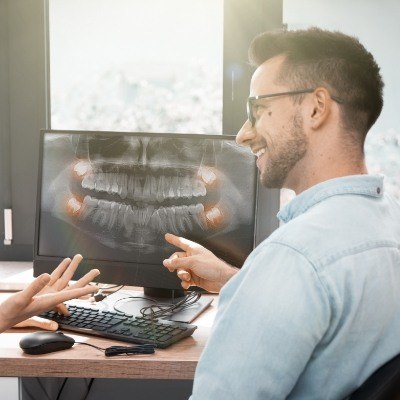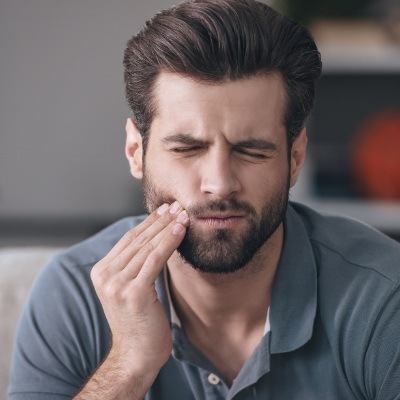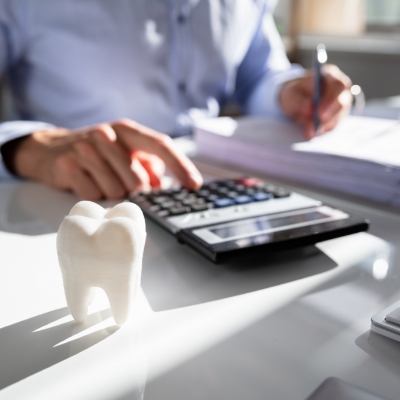Emergency Dentist – Chesapeake, VA
Act Fast and Relieve Your Dental Pain!

By their very nature, dental emergencies only happen at the worst possible times. You’re playing a game with your friends, and before you know it, something collides with your mouth and a tooth is knocked out. Or you suddenly realize that your minor toothache has turned into searing pain. In these situations, time is often of the essence, and you need to act fast in order to relieve your pain and save your smile. If you or a loved one find yourselves in the middle of a dental emergency, you just need to remember one thing: call Troisi Dentistry to schedule a visit with our emergency dentist in Chesapeake, VA.
Why Choose Troisi Dentistry for Emergency Dentistry?
- Same-Day & Walk-In Emergency Dental Appointments
- Highly Experienced, Compassionate Dentist
- Advanced, Modern Dental Technology
How We Treat Dental Emergencies

- Same-day appointment – The moment you notice something is not quite right with your smile, please give us a call right away. Not only are you more likely to get an appointment scheduled the same day when you do, but we can provide first-aid tips over the phone and answer questions you may have.
- Emergency exam – When you do arrive, Dr. Troisi will get you seen for an emergency exam. This process includes not only a close examination of your mouth, but potentially digital X-rays if needed to confirm the source of your symptoms.
- Review findings – Our team will go over their findings with you, then recommend specific treatments they believe will resolve your emergency and prevent it from coming back. This recommendation also includes the estimated costs and length of time to complete.
- Get the care you need – While the length of treatment can vary depending on your emergency, we will work as quickly as we can to get you the relief you need. Common treatments we recommend for dental emergencies typically include dental fillings, same-day crowns, root canal therapy, and extractions.
The Most Common Dental Emergencies

Dental emergencies can come in many different forms, making their treatment and management difficult to know at first. That’s why we recommend you call our dental office so a professional can help. In the meantime, here’s what you can do to prevent your emergency from taking a turn for the worse.
Understanding the Cost of Dental Emergencies

Without performing a more detailed examination of your mouth, we can’t know for sure how much your dental emergency will cost you. Following this evaluation, we’ll have a better idea of which treatment will address your symptoms at the source, and therefore a better understanding of your final costs. We’ll clearly break down your treatment estimates so that you’ll never be caught by surprise fees. Keep in mind that putting off emergency care you need now can help you reduce higher costs down the road.
Every Dental Emergency Is Different
Until we get you to our dental office and perform an emergency exam, it’s extremely difficult to know what the cost of your care will be. For example, we’ll need to understand the root cause of your symptoms and then create a treatment plan from there. While some dental emergencies are relatively simple to resolve, others may require more complex procedures and additional appointments to address. In certain cases, removal of decay and placement of a filling could be all that’s needed, but in other circumstances we may need to perform root canal therapy and place a crown, which costs far more.
Does Dental Insurance Cover Dental Emergencies?
In most cases, dental insurance companies offer some form of coverage for dental emergencies. One of the most common benefits they offer is one emergency exam per year. While it can vary by plan and provider, they may also provide partial coverage for services to treat damaged teeth, including crowns, extractions, and root canal therapy. Keep in mind that plans may only offer to cover between 80% and 50% of the cost. Every plan is different and may come with their own stipulations, including unique annual maximums, so be sure to confirm these details ahead of time before committing to a treatment plan.
Other Options for Making Dental Emergencies Affordable
While dental insurance is often utilized to cover the cost of emergency care, it’s not the only option available to you. For example, third-party financing from CareCredit enables you to pay for treatments in smaller, monthly installments. These payments also come with little to no interest attached, making it even easier to fit into your monthly budget. Alternatively, our in-house membership plan can help you cut costs on preventive dentistry visits and access discounts on restorative care. We also offer unique patient specials that can help you save money further depending on the emergency treatment you require.
Taking Care of Your Smile Can Save You Money
Dental emergencies can be unavoidable in certain circumstances, but often times they develop as a result of poor at-home oral hygiene. The best way to avoid dental emergencies is by investing in routine prevention, a habit many people let go by the wayside. By brushing and flossing every day and avoiding habits that can easily damage teeth, you could potentially save hundreds (if not thousands) on oral healthcare costs annually.
Additionally, the moment that you become aware something is not quite right with your tooth or mouth in general, call us. The sooner you get your issue taken care of, the less likely you’ll need to pay for treatments to resolve a worsened dental issue (i.e., a decayed tooth that needed a dental filling several months ago but now needs a dental crown).
Keys to Preventing Dental Emergencies

In a perfect world, no one would ever experience a dental emergency. Unfortunately, that isn’t the case. Accidents can still happen that are impossible to predict, harming your smile in an instant. More often than not, though, the reason why a patient has to suddenly visit our emergency dental office in Chesapeake is because an oral health issue has been steadily worsening over time. In fact, many dental emergencies are avoidable if you take the following precautions.
Visit Our Dental Office Regularly
Make sure to schedule a routine checkup and cleaning with our team every six months. That way, Dr. Troisi can catch minor issues before they worsen into full-blown emergencies later on. Often, oral health problems like tooth decay and gum infections don’t even cause discomfort until they have progressed into the more advanced stages, making them more difficult to treat. Luckily, regular preventive dental care can stop these issues in their tracks. Plus, our team can remove built-up plaque and tartar that are often to blame for these problems in the first place.
Maintain Good At-Home Oral Hygiene
If you truly want to prevent dental emergencies in Chesapeake, you’ll also need to keep your teeth and gums clean at home. To that end, we recommend brushing twice a day for two minutes per session, flossing at least once a day, and using an antibacterial mouth rinse on a regular basis. These simple daily habits go a long way toward preventing the buildup of plaque and tartar that contributes to cavities, gum disease, and other dental emergencies. If you use toothpaste or mouthwash that contains fluoride, you’ll also get the added benefit of making your teeth stronger against decay.
Eat a Balanced Diet
It’s no secret that eating too much candy is harmful for your teeth, but starchy foods also carry that risk. Starch breaks down into sugar in the mouth, so cavity-causing bacteria can use it as fuel to produce destructive acids. For this reason, try to consume sugary and starchy foods like bread, potato chips, and cookies in moderation. Eating them every now and then is fine, but make sure your diet contains mostly healthy foods like fresh fruits and vegetables. In particular, vitamin C is great since it promotes healthy gums.
Wear a Mouthguard
If you play a sport that comes with a moderate to high risk of impact to the face, it’s in your best interest to wear a mouthguard over your teeth that shields your smile from injury. Similarly, you should wear a nightguard if you have a chronic habit of grinding your teeth and clenching your jaw while you sleep, as this habit could weaken your teeth and leave them more susceptible to breakage. Dr. Troisi can craft you a personalized mouthguard or nightguard that is more comfortable and effective than over-the-counter solutions.
Don’t Use Your Teeth as Tools
As tempting as it may sound to crack open nuts or open packaging with your teeth, it’s just not worth it. One slip and you could easily end up with scratched gums or a broken tooth. Even if that doesn’t happen, habitually using your teeth as tools could weaken them over time, increasing the risk of emergencies. Avoid the temptation by always keeping the appropriate tools close by.
Dental Emergency Frequently Asked Questions

Do you have a plan in case you ever need to deal with a dental emergency? Are you concerned about the kind of care your emergency dentist in Chesapeake can offer in the worst-case scenario? It is always better to ask any questions you have long before an issue actually occurs so that you don’t lose any time when you require treatment. Below, we have listed just a few common concerns that patients often have. If you have any additional questions, please do not hesitate to contact our dental office.
Is It Ever Necessary to Call the Hospital for a Dental Emergency?
Broken teeth and toothaches need immediate attention, but they are not the kind of issue that a hospital emergency room is equipped to deal with. For most cases where you’re suffering from pain or an injury related to the mouth, we can provide you the expert care you need at a reasonable cost. That said, you are better off calling 911 for especially dangerous problems that need to be addressed right away, including:
- A broken or otherwise fractured jaw
- Swelling of the gums or other oral tissue that makes breathing or swallowing difficult
- Any kind of cut that won’t stop bleeding even after you apply pressure to it with a piece of gauze
What Does Chronic Bad Breath Mean?
Also referred to as “halitosis,” this condition is not caused by simply eating a piece of onion or garlic. Instead, this occurs when proper oral hygiene is neglected. Bacteria can accumulate inside the oral cavity, causing plaque and other harmful particles to damage tooth enamel, attack soft tissues, and create a foul odor. Simple brushing and flossing will not be enough to hide the smell, so you will be required to visit our dental office for professional help. Smoking is also known to cause halitosis, which is why you are strongly encouraged to kick the habit as soon as possible.
How Much Time Do I Have to Save a Knocked-Out Tooth?
It is possible to put a freshly lost adult tooth back in your mouth, but the window of opportunity to do so is very limited. You should get to our dental office no later than an hour after the initial injury has occurred. Before the surgery, it’s important that you avoid damaging the root of the tooth; that means you should only pick the tooth up by the crown and avoid placing it in water (which could damage living cells that might still be attached to it). If replantation is no longer possible, we can discuss other options, such as dentures or dental implants.
What Does Throbbing Tooth Pain Mean?
A simple toothache may be treatable with an over-the-counter pain reliever or antibiotics, but throbbing pain is usually a sign of something more serious. If you are experiencing this sensation, it’s probably because you have an infection or swelling caused by dental cavities or damage. If left untreated, you can develop severe problems that spread beyond the enamel and into the innermost layers of your tooth. If the area consisting of tissues and nerves (the pulp) is irritated or inflamed, the only solution capable of saving your tooth is a root canal.
If an infection is not the issue but instead, you suffer from bruxism (teeth grinding), our team may need to recommend a customized nightguard for you to wear to minimize the breakdown of your tooth enamel and additional jaw pain.
What Should Be Included in a Dental Emergency Kit?
If you experience a dental emergency in Chesapeake and you’re away from home, do not panic. Instead, make sure you have access to a specialized kit that will help you manage your symptoms until you can get in to see a qualified professional. Some of the items you should include are:
- Gauze pads and dressings
- Sterile gloves
- Small container for teeth or lost/broken restorations
- Cotton balls
- Dental cement should your crown or filling fall out
- Denture adhesive
- Anti-inflammatory medicines (i.e., ibuprofen)
- Floss
- Ice pack
- Topical anesthetic
- Our Dental Office’s phone number
How Much Will My Emergency Dental Visit Cost?
“Dental emergency” is a rather broad category; it could be caused by an infection, or it might be an injury you suffered after getting hit in the mouth. Because of that, you won’t have an idea of how much you can expect to pay until after we’ve checked your mouth. Dental insurance can help you cover the cost of your care, but patients who don’t have such coverage can ask about financing options.
I Need a Checkup & Cleaning I Need a Dentist for My Child I am Concerned About Bleeding Gums I Have a Cavity or Broken Tooth I am Missing One or More Teeth I Want to Enhance My Smile I Want a Straighter Smile I am Scared of the Dentist I Need My Wisdom Teeth Removed I Have Pain in My Jaw View Our Services
